Reviews and thoughts on various TV shows Alfred has seen.I cater for different audiences, search for 'live action tv' or 'animated tv' in my search depending on what you like.REVIEWS MAY CONTAIN SPOILERS, READ AT YOUR OWN RISK
Don't wanna be here? Send us removal request.
Text
Public Eye - John VII. Verse 24 (Season 5 Episode 13; 29 September 1971)
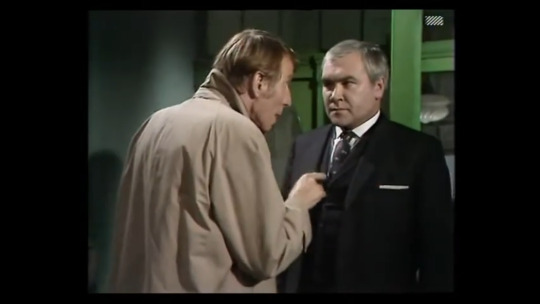
"Judge not according to the appearance, but judge righteous judgment." - John 7:24, King James Bible
The above Bible verse that provides the title of this episode, the finale of Season 5, which is also partially quoted by DI Firbank (Ray Smith) to Frank Marker (Alfred Burke) perfectly sums up the theme of this episode: things may not be as they appear and careful judgement should be used to arrive at the truth.
It is an episode that challenges what we know about DI Firbank, who despite his clashes and suspicions of Marker has up to this point generally been portrayed as an honest enough policeman concerned with doing his job well, and certainly Marker has this level of respect for Firbank despite his frustrations whenever Firbank occasionally suspects him.
Jane Holland (Gillian Wray) goes to Marker's office asking him to help her husband David (Jeremy Bulloch), a policeman who has been suspended from duty after being accused of stealing £4 from a woman's handbag that he found and handed into a police station. David had also seen DI Firbank talking with Alec Payton (George A. Cooper), a known criminal in a bar and told by Firbank not to mention anything about it, suggesting this is the actual reason David was suspended and forcing Marker to confront the possibility Firbank may not be as honest as he thought.
As Marker investigates, we see from his point of view a number of events that certainly seem to paint Firbank in a less than flattering light including Firbank buying a new expensive car and handing an envelope to Payton at a rendezvous. When Firbank learns that Marker is helping the Hollands and apparently investigating him, he is particularly harsh with Marker and warns him to back off, even to the extent of threatening him with another spell in prison if he doesn't stop.
Though of course, keeping in with the theme of the aforementioned Bible verse, there could just as easily be another reason why Firbank is doing all this even if it ends up making him look corrupt and even the motivations of the Hollands might not be as they appear either…
After a season of episodes whose overall standard has been very high, this season finale does not disappoint and certainly brings the season to an end on a very high note indeed. It's focus on DI Firbank and whether he is truly honest makes this episode extremely gripping, thanks to truly great writing from Peter Hill for his only Public Eye episode.
Marker's feelings about DI Firbank being possibly corrupt and also the way he's treated by the Hollands is also interesting and well-written, with Alfred Burke seeming to absolutely thrive off the material he is given here, providing one of his best ever performances as Frank Marker in any Public Eye episode. His concern at Firbank possibly being corrupt and his frustration with the Hollands, particularly when they suddenly drop him shortly after he agrees to accept their case when David seems to be leaned on by Firbank is particularly memorable and convincing. Yet despite all this and the threats from Firbank to make trouble if he doesn't stop, Marker remains determined as ever to see the investigation through and find out the truth.
The Hollands are also interesting characters, with Jane seeming to make the most effort to try and clear her husband's name while David seems more resigned to his fate. As the episode goes on, we learn more about them and what truly happened with David's career in the police, with some very interesting twists regarding them.
One of the more minor characters, Mrs. Durrant (Gladys Spencer), the woman who had lost her handbag and noticed the missing £4 is another memorable character, in part due to her being an eccentric keeper of parakeets. Unlike what Firbank apparently believes, Mrs. Durrant does not believe that David could possibly have stolen the £4 since she believes no policeman could be capable of such dishonesty and it's her who later helps with a breakthrough for the Holland case though by that point with events having progressed this breakthrough is ultimately for nothing.
George A. Cooper is also good as the villain Alec Payton who runs an apparently normal plastics business but is secretly preparing for a robbery on a van at the Slough Trading Estate, for which Firbank is apparently supplying him information about. When Marker visits him pretending to be interested in taking part in the robbery, claiming he had a reference from Winson Green prison to vouch for him, Payton is unconvinced and this is a mistake that Firbank uses against Marker since Payton is the one who tells him.
Speaking of Firbank, Ray Smith does an excellent job making Firbank look suspicious here and we are definitely tempted to believe he may be corrupt. His confrontations with Marker are also excellent, with both Smith and Burke on absolutely top form in these encounters. The payoff at the end as we learn the truth behind what he's been doing is also extremely satisfactory and brings events to a perfect end.
Overall, John VII. Verse 24 is as perfect a season finale as one could ask for in Public Eye's high quality fifth season. The next season would see only modest changes as Frank Marker remained in Windsor, but would benefit from being in full-colour throughout and also the return of co-creator Roger Marshall to write some episodes, who had sat out Season 5, the only season he did not contribute any episodes for. Though his return was undoubtedly welcome, this season has been ample proof that the other writers who contributed episodes have been more than up to the task of providing their own engaging, high-quality scripts.
0 notes
Text
50/50 Heroes - My Friend the Internet (Episode 41; 27 March 2023)
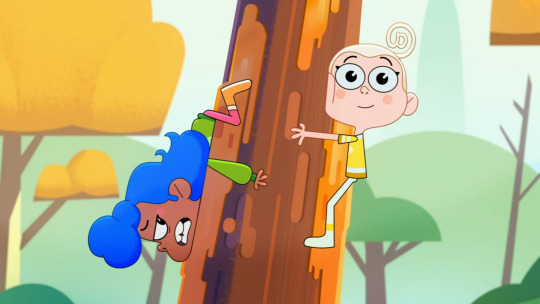
Mr Brick organizes a treasure hunt in the forest where his students will receive riddles and the answers will lead them toward a golden sock, the winner gets to choose where the next school field trip will be. Knowledge of the riddles requires the students to be up to date on their lessons and phones are banned on the trip.
Mo however fails to learn anything in time and so ends up summoning a power to have all the knowledge of the Internet. The half power generates 2 people who Mo and Sam name Bob and Daisy respectively (their real 'names' being just noise) who possess an encyclopaedic knowledge of the Internet. Mo uses Bob to help solve the riddles in order to find the sock while Sam finds herself stuck with Daisy, who she finds isn't helping the situation...
This episode has one of the more inventive powers in 50/50 Heroes with Bob and Daisy essentially acting as personifications of the Internet. In an unusual move for the show, the full power is never shown, so only the effects of the half power are seen. Both Bob and Daisy have a really funny habit of speaking their knowledge of the Internet out loud whenever they see anything, even accidentally insulting others such as when Bob says Miss Rosie's dog has been rated as "one of the top five most ridiculous canines in the world".
Mo and Sam's interactions with Bob and Daisy are both really interesting in different ways. Mo convinces Bob that he is his buddy and that he should only help him after he finds Bob giving directions to everyone else at the treasure hunt. But JC is equally adept at manipulating Bob, claiming that Bob is his best friend which makes him regard JC higher than Mo so he can help with JC's own riddles instead.
Sam's interactions with Daisy are definitely the funnier though, with Daisy's efforts to help either being ineffective or making the situation worse, perhaps a commentary on the large amount of misinformation available on the Internet and also the pointless clickbait offering useless or impractical advice. A hilarious example of this comes when Sam finds herself stuck to a tree and Daisy's answer is read off a top 100 solutions list from the Internet on how to get free, getting stuck herself in the process. However, it's Sam's ingenuity, using the warm water from her pigeon spa she has created that eventually gets them both unstuck.
The final scenes also provide an interesting change in direction, with an unexpected yet amusing squirrel attack on JC with numerous squirrels forming together to essentially form what appears to be a giant squirrel mech! Again it's Sam's intelligence which saves the day compared to the rather useless information given by Bob and Daisy and the ending concludes things on a heart-warming note while Mo learns a valuable lesson about his own intelligence...
Overall, My Friend the Internet is one of my personal favorite episodes of 50/50 Heroes, with the depiction of all the Internet's knowledge personified in Bob and Daisy being a particular triumph, a superb effort.
0 notes
Text
Camp Lakebottom - Escape from Camp Lakebottom/ Rise of the Bottom Dwellers (Season 1 Episode 1; 4 July 2013)
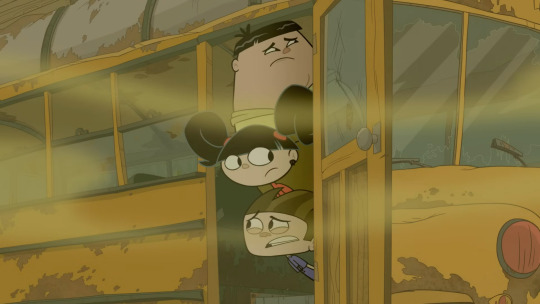

Today is the 12th anniversary since the first episode of Camp Lakebottom was aired, one of my personal favorite animated series to have come from Canada which was always wonderfully surreal and featured some really fun and unique characters.
The show took place at the titular camp where young campers McGee, Gretchen and Squirt were under the care of 3 unique counsellors: zombie Sawyer, sasquatch Armand and killer cook Rosebud. Despite the abysmal living conditions at the camp and the deadly wildlife surrounding it, the trio of campers made the most of their time there while often dealing with their rivals: Buttsquat and McGee's sister Suzi from the rival camp across the lake, Camp Sunnysmiles.
The first segment helps set up the premise of the show well. McGee and Suzi are preparing to go to Camp Sunnysmiles for the summer, only for McGee to be shut out of the bus by Buttsquat, forcing him to ride in a dilapidated old bus there, where he meets Gretchen and Squirt for the first time. Enroute, Buttsquat diverts the other bus away from the road to Camp Sunnysmiles, with the trio eventually ending up at Camp Lakebottom. Thinking the inhabitants there want to kill them, they try to escape across the lake to Camp Sunnysmiles, only to learn they were better off staying at Lakebottom...
Although the show's intro sequence already gave us an idea of how creepy the show can be, the campers' initial arrival at Camp Lakebottom is portrayed very effectively portrayed in a horror movie style as they attempt to escape the counsellors and wildlife, genuinely believing they are in danger from them. What's particularly interesting is that the lines the counsellors have sound like they can have an innocent meaning but out of context with the campers unfamiliar with them, we can understand why they are terrified and desperate to escape since it does sound like they intend to harm the trio.
This segment also has enough time for us to get used to the characters and establish their personalities. McGee is the one who often has a plan and takes the lead, Gretchen is often sarcastic and has kung-fu skills while Squat knows other creatures well and is more willing to give Camp Lakebottom a chance compared to the others. Meanwhile, Buttsquat, determined to always torment McGee and Suzi, who does nothing to help McGee quickly establish themselves as unlikeable villains with little if any redeeming qualities. The friendship between the trio is also quickly established and I always enjoy their interactions so much, another thing the show does well.
The ending of the segment, though predictable is also nicely done and it's also satisfying to see Buttsquat get his comeuppance, which will of course often happen to him throughout the show. With the campers deciding that Camp Lakebottom is a better alternative to being mistreated at Camp Sunnysmiles, it brings to a close a great first segment that makes a superb first impression.
The second segment, Rise of the Bottom Dwellers seems to begin at least a few days after Escape from Camp Lakebottom as Gretchen mentions a scorpion toss event that occurred yesterday in the first scene. However, the opening scenes make it seem as though the campers are not used to the conditions at the camp, with a number of funny scenes where they are taken by surprise including the 'toothpaste' available being slugs and the oatmeal being served by Rosebud is actually alive, with Squat adopting his living oatmeal as a pet.
Soon after, the real plot kicks off as Buttsquat comes by in his luxurious boat to taunt the campers and insult Camp Lakebottom. This offends McGee and he is determined to prove his camp is better by beating Buttsquat in a number of challenges. After a few defeats and McGee refusing to back down despite the others urging him to, Buttsquat and McGee race to the top of Mount Fit-To-Blow to plant their respective camps' flags, which may have dire consequences considering the mountain's a volcano...
This second segment is definitely a step down from the excellent opening segment but still provides several fun moments including the previously mentioned opening scenes and it's fun seeing how the different activities function at Camp Lakebottom, there is also an entertaining scene where the campers (except McGee who only ends up tying himself up) knit impressive models after learning from Armand.
The frequent one-upmanship of Buttsquat and McGee can ultimately be a bit repetitive and exhausting but there are some inventive moments too in their challenges such as Buttsquat's climbing wall extending all the way to space and Slimy, the lake's kraken generating surf waves for the campers as the lake seems to be completely non-tidal. Above all, it's a taste of what's to come in future episodes of the kind of thing one can expect at the camp, and this segment does the job well enough.
In all, this first episode of Camp Lakebottom makes a great first impression and rewatching it reminded me of why this became a favorite of mine when I discovered it. With pretty much the entire series available on an official YouTube channel at the time of writing, I recommend trying the show as it's always one I've found enormous fun.
1 note
·
View note
Text
Public Eye - Shades of White (Season 5 Episode 12; 22 September 1971)
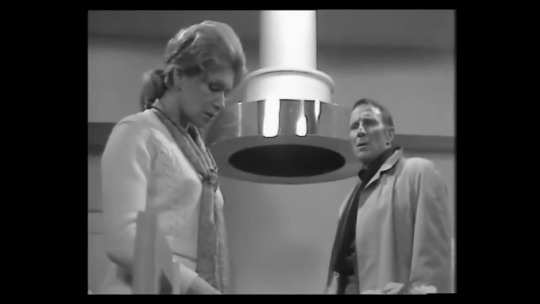
Perhaps a more apt title for this episode would be Shades of Black and White since this is the final Public Eye episode broadcast in black and white, one of the initial batch of Season 5 episodes produced during the ITV Colour Strike. It's position as the penultimate episode of the season is curious and feels out of place among the colour episodes that surround it given that the 4 previous black and white episodes of the season all came during this season's first half.
The Biddersloe family is not a happy one, with father Allan (John Collin) and daughter Anne (Lesley Anne Down) particularly at odds with each other. Allan is not happy about the company Anne keeps and hires Frank Marker (Alfred Burke) to investigate the 2 men Anne is often hanging out with.
Complicating matters is DI Firbank (Ray Smith), aware that Marker is working for Allan telling him that Allan is politically ambitious and that there have been a string of robberies connected to the parties Anne has been attending among the rich set of Windsor.
Firbank is also investigating Barbara Lewson-Jones (Sheila Allen), the Biddersloes' housekeeper who he suspects may be connected with the robberies, but Marker, who meets her a number of times and learns she has spent time in prison thinks Firbank is prejudiced against her because of her past crimes. But who is actually behind the robberies and will Marker's investigations bring together the Biddersloes or tear them apart further?
This episode's main strength is the characterisations of the members of the Biddersloe household. Allan may be fierce and hot-headed, but he does care for his daughter deep down despite his frequent disapproval of her behaviour. He is also one of the less-satisfied clients of Marker, accusing him of losing focus as he delves deeper into the case and even pre-emptively sacks him at one point.
Allan's wife Eve (Helen Shingler) also cares deeply about her daughter but feels she has squandered her chance to be closer to her as she has spent much time away in Switzerland. There's also a kind of tragic helplessness about her as her efforts to keep the peace in the family are mostly futile.
Anne is perhaps the most interesting character, despite having a fearsome father she is more than able to hold her own against him, not even losing her nerve as he frequently scolds her and even trashes her room in the episode's opening scene. She does seem to delight in being a rebellious daughter, naturally this is regarded as rude by her parents. She also appears to have an analytical mind and quickly sees through the cover Allan has provided for Marker that he's a quantity surveyor helping with his property business and that he's really an inquiry agent. It is she who provides perhaps the neatest summary of the Biddersloe household dynamic: "Daddy's a bully who married money, mum is going to seed, I sleep around and the home help's on probation".
Barbara also recognizes Marker for who he is, since she frequently shops in Eton and has seen him in his office. Despite her suspicions, she is open with Marker and seems interested in spending time with him, with the 2 going out for tea together on her afternoon off and eventually wanting Marker to have a drink with her together on the same night he is to investigate the party Anne is hosting at the Biddersloe house, leaving open the question of whether she really likes Marker as a friend or is simply stringing him along for an ulterior reason.
Despite the interesting characterisations and a good twist near the end, the writing by Robert Muller (his only Public Eye episode) is to me a bit muddled, with things a bit less clear than they should be at times and some questionable leaps of logic. The ending, showing a sudden change in the Biddersloe family relationship following the resolution of the case is a notable example, it is simply too unbelievable to imagine it would change so quickly after all that's happened between them all, the issues in the family seem to go a lot deeper than those that can be fixed quickly.
Although Piers Haggard's direction is generally good, some of the location filming looks rather low quality and there is also some bothersome fog affecting the location scenes near the end where Marker and Firbank follow Barbara.
Overall, Shades of White is not one of the best episodes of Season 5 but the characterisations just about help to ensure this remains an interesting enough outing despite it's flaws.
0 notes
Text
Wayside - Pull My Pigtail/ Class Cow (Season 1 Episode 1; 25 June 2007)

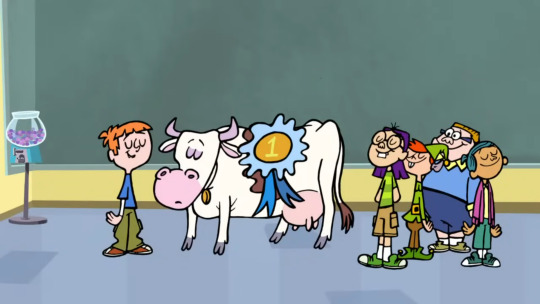
Wayside recently celebrated it's 18th anniversary since it's US debut (with this first episode having been broadcast a few months earlier in Canada following a 2005 TV movie, with clips from the movie appearing in the show's intro sequence) and as is usual here, an episode review is called for.
The show, based on Louis Sachar's Wayside School books took place in an unusual school with 30 floors, where everything is weird. While there were many equally weird yet loveable characters among both the students and faculty, newcomer Todd who isn't used to the way things are done at Wayside relates closest to the audience, asking the questions we would ask if we were in his position.
The first segment of this opening episode, Pull My Pigtail is a good example of the Wayside students' unusual behavior in action. Dana is planning to celebrate Valentine's Day, which has Todd wary since he suffered during her previous holiday celebrations. Dana decides to try and get 2 people in love and noticing Maurecia's crush on Todd attempts to get him to fall in love with her. To this end, she puts Todd next to Maurecia in class and puts them too close together. This eventually causes trouble during Mrs Jewls' lesson as Maurecia's pigtail repeatedly hits Todd, yet he is the one getting in trouble for attempting to mitigate the problem...
While this first segment pretty much assumes the viewer is already familiar with the aforementioned 2005 TV movie with no major introductions, even if one has not seen it, this is still sufficient to make a good first impression. In particular it showcases 2 elements of the show that I particularly enjoy.
One of these is Dana's eccentricity, which is always really funny to see and is on full show here as she really gets into trying to celebrate Valentine's Day, complete with her using her friend Myron as Cupid (leading to a funny subplot where Principal Kidswatter mistakes Myron as Cupid for his guardian angel). Her unique methods of bringing Todd and Maurecia together are also really fun to see, as is the flashback where she celebrates other holidays, with unfortunate consequences for Todd.
The other of these elements is the depiction of Maurecia's crush on Todd and this segment explores their relationship in a good amount of detail. Maurecia is always expressing her love for Todd by punches, yet she denies this despite all the evidence to the contrary. While she loves Todd, he seems less interested in her and is not happy with Dana's efforts to force them together into being a couple and it's transparent enough for Maurecia to see through this too. Seeing Todd and Maurecia together is always interesting as their relationship is well-written and this segment makes the most of it's Valentine's Day theme to show it off well.
The other segment, Class Cow on the other hand is a great example of just how weird things get at the school. Todd has to navigate his way through a herd of cows scattered throughout the school, only to find when he arrives in the classroom that Mrs Jewls isn't there, with her and the other teachers on a faculty retreat with Principal Kidswatter (actually a party).
A cow named Mrs Bellamy then enters the classroom and while the rest of the class easily accept her as their new teacher despite the fact she does little but eat everything, Todd refuses to accept that his teacher is a cow and can hardly believe what's going on. Meanwhile, Mrs Jewls is concerned for her class and breaks out of the faculty retreat, climbing her way to her class to check how they're doing.
The utter weirdness of having a class taught by a cow (who isn't really doing anything) and how all students except Todd simply accept this is executed brilliantly and there are several funny moments as the class mistake Mrs Bellamy's hunger for teaching while Todd tries to make the rest see sense, but they simply regard him as a killjoy and a rebellious student.
Yet Todd is also able to indirectly inspire the class (via an assumed affirmation from Mrs Bellamy) to explore their feelings, leading to them changing briefly in interesting ways (until Mrs Jewls returns), which also leads to him finally appreciating Mrs Beallamy more...
While both segments contain several examples of what makes Wayside a fine show, they also both unfortunately display one of the show's main flaws, one that means the show never quite scales the heights of the all-time greats, namely the frequent punishment of Todd by Mrs Jewls for his supposed infractions, which leads to him being sent home on the kindergarten bus.
It's an element of the show I've always regarded as unfair and cruel on Todd given his infractions are usually minor, are often forced on him by circumstances out of his control and also makes Mrs Jewls unlikeable, a shame as she otherwise is a rather funny teacher. However, when much of the rest of the show comes off well, it's easier to forgive this flaw although it can't be forgiven entirely.
Overall though, both Pull My Pigtail and Class Cow are fine examples of what would make Wayside an enjoyable show, a good way to start the series proper.
0 notes
Text
Public Eye - Transatlantic Cousins (Season 5 Episode 11; 15 September 1971)
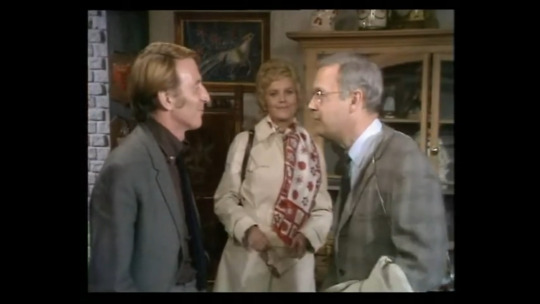
The L'Ettrell family, American tourists visiting Windsor with roots in the English aristocracy find cutlery bearing their family crest in the window of Manor Antiques, the store Nell Holdsworth (Brenda Cavendish) works at. After purchasing it, father John (Warren Stanhope) hires Frank Marker (Alfred Burke) to see if he can find the L'Ettrell relatives living in England, reckoning they must have sold the cutlery to Manor Antiques.
Hubermann, the owner of Manor Antiques had purchased the cutlery from Thompson (Geoffrey Denton), a silver dealer, who in turn was sold it by a young man who claimed to be selling it on behalf of someone else who wished to remain annonymous. This raises Marker's suspicions that the cutlery might have been stolen, so now he must determine if John L'Ettrell has unwittingly purchased stolen goods while trying to find the English L'Ettrells.
Before continuing, the elephant in the room regarding this episode (the second written by James Doran immediately following his first effort, the preceding episode Ward of Court) must be addressed and that is that the American L'Ettrells are very poor characters indeed, who seem to have wandered onto the set of Public Eye from a bad American sitcom, with the actors involved giving ill-fitting performances that are out of place for Public Eye complete with dire exaggerated accents.
They aren't even authentic Americans either, unlike the equally poor American tourists from The Beater and the Game who at least were played by a pair of genuine American actors. Warren Stanhope, playing the father is Canadian while Patricia Cutts and Luan Peters, playing mother Barbara and daughter Lana respectively are both British. The L'Ettrells' importance to the plot means their performances must be put up with, which can make this episode hard-going particularly the first act in which they are most prominent.
There are also a few undignified scenes that don't quite fit the Public Eye mood, such as Marker peering under a public bathroom stall looking for someone (while Public Eye is often appropriately seedy, this is going too far in my opinion) and the final scene being Marker sneezing right before the end credits roll is definitely not one of the best ways an episode has ended, a poor directorial choice from Dennis Vance who had done a great job directing I Always Wanted a Swimming Pool but his work here pales in comparison, though he is always solid with location scenes.
If you were fearing however that all this sets the tone for an awful episode, fear not because after a slow start the episode gradually improves and it helps that after the first act, the presence of John and Barbara, the worst of the L'Ettrells is much reduced although Lana tags along with Marker. Despite Luan Peters' poor performance, the contrast between her and Marker is interesting to see.
A good example of this comes in the scene where Marker and Lana visit Tom Dixon (Henry Knowles), who sold the cutlery to Thompson and refuses to tell Marker who gave him the cutlery. Marker's direct approach, which ultimately leads to him phoning the police to find out if the cutlery was stolen fails to work on Tom but Lana has better results since Tom is attracted to her and she takes advantage of this to eke more information out of him in return for promising to see him again.
The introduction of Sir Roger L'Ettrell (David Hutcheson), one of the English L'Ettrells who the American side of the family is seeking later on in the episode is also welcome. He is the episode's most interesting character. He and his daughter Caroline (Annette Kerr) had previously met John when he was stationed in England during World War II. As an ageing fallen member of the aristocracy who has squandered his wealth (forcing him to sell the cutlery) and has little to look forward to now except death, he is bitter and disdainful towards his American relations, wanting nothing to do with them, having not liked John the first time they met.
Yet having heard of their wealth, he is also interested in the idea of potentially milking his American relations to improve his own situation and wants Marker to hide the fact he sold the cutlery from Caroline, but Marker doesn't want any part of this and is faced with having to break the news about Roger's opinion to the American L'Ettrells. Roger also doesn't seem to be treated particularly well by Caroline and his son-in-law since he describes them as stingy and they forbid him from accessing the drinks cabinet. He is as equally disdainful about the company they keep as he is about the American L'Ettrells as well, bitter they get the alcohol and cigars he's not allowed to have.
While this episode's flaws mean that this must go down as one of the weakest episodes of Season 5, this episode ultimately does reward those who can put up with the episode's more dire moments with an interesting and thoughtful look at how different branches of the same family can view each other. While overall a mixed bag, Transatlantic Cousins still ends up being a satisfactory outing.
0 notes
Text
50/50 Heroes - Toop Toop Quest (Episode 36; 28 March 2023)
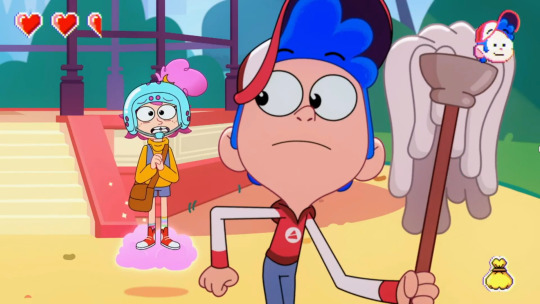
Mo is obsessed with the video game Toop Toop Quest but is also supposed to be taking part in a park clean-up organized by his father. To resolve this problem, he decides to summon a power to enter the game, but this has the effect of making the real world become more like a video game, complete with a video game-like interface appearing too.
Sam and most of her classmates are captured by Toop Toop, who appears to be possessing Mr. Brick's wig while Mo finds himself having to first clean up the park to obtain a 'wizard staff' (actually a mop) before heading to the school to rescue Sam and beat the game...
What a masterpiece this episode of 50/50 Heroes is, this is perhaps my favorite ever episode of the show, this episode offers a lot to see and just about everything comes off absolutely perfectly.
The depiction of the video game power is absolutely masterful and imaginative, helping to make this episode supremely funny as the power parodies a number of video game tropes. The way the power influences the real world makes it become a lot like an RPG game complete with traditional cliches of the genre such as a wise king (Mo's dad) who gives a quest to the hero (Mo) as his land is under attack by an evil force (Toop Toop). Continuing to use Mo's dad as an example, he also talks in text boxes which Mo ends up frantically skipping through to get to the important part about the quest he is supposed to do.
As they have become player characters thanks to the power, Mo and Sam also have a life bar and must be careful to avoid dying plus they can collect rubies as currency, with Sam having to earn 100,000 rubies by sorting books in the classroom before she can escape it (though she is able to bypass this by using the books to climb up and escape into an air vent). Meanwhile Mo is forced to clean up the park to gain the wizard staff before he can continue his quest to rescue Sam and defeat Toop Toop. Naturally as Mo hadn't expected this, he isn't happy about it and his feelings are best summed up with this line: "What kind of game is this? It's more like real life!". Another great touch with the power is that the game's music also ends up being played for real on a flute by Mr. Brick!
The final scenes in which Mo and Sam finally reunite and use the full power to defeat Toop Toop and beat the game are also really imaginative, with the show's style taking on the look of old-style video game graphics as Mo and Sam truly enter the game and work together to defeat Toop Toop.
Finally, the subplot involving Noomi attempting to use the park clean-up as a chance to spend time with Mo, who she has had a crush on for a long time is really adorable to see and as one of the only people who avoided being taken by Toop Toop also assists Mo in his efforts to navigate the video game influenced world.
As one of my favorite supporting characters in the show with her sweet personality, it is nice to see Noomi get a substantial role here and one can certainly root for the idea of her and Mo being a couple, an idea rarely explored in the show with the 2 part Swatteroo the Sublime finale being one of the only other episodes to explore this relationship in any depth.
In conclusion, Toop Toop Quest is an absolute success and the high point of 50/50 Heroes, in a show with so many great episodes, this is truly something special and a must-see slice of classic TV.
0 notes
Text
Public Eye - Ward of Court (Season 5 Episode 10; 8 September 1971)
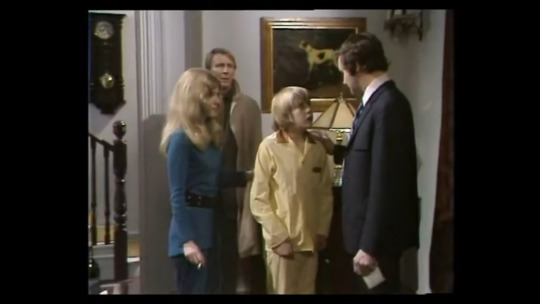
Frank Marker (Alfred Burke) is tasked by fast-talking Sheffield solicitor Smythson (Barry Warren) to locate young boy David Bailey (John Ash) on behalf of his mother Ruth (Stephanie Bidmead), with David having been taken 8 months ago by his father Martin (Brian McDermott). Martin is known to be in Windsor, so Marker needs to locate where exactly Martin and David are living.
Smythson also wants DI Firbank (Ray Smith) to help out but as Martin has not committed any crime yet and that the police can't be involved until Martin is served with the court order to return David, Firbank is initially unable to help.
Marker is able to find Martin's whereabouts, in part thanks to Martin's connection to Arthur Bellingham (Norman Jones), a former employee at the engineering company he works for who Marker is investigating on a seperate matter. Martin is living with his son and new girlfriend Ann (Julie Samuel) in Windsor. Once his location is known, Ruth also travels down to Windsor, determined to get her son back.
The first of writer James Doran's 6 Public Eye scripts, this is an impressive effort that poses an interesting moral dilemma for Marker regarding the efforts to find Martin and David. David is very happy living with his father and does not want to return to his mother. Martin is prepared to break the law and go to jail for contempt of court if that's what it takes to stop Ruth getting David back.
After having noticed how happy David seems to be living with his father, the dilemma for Marker is thus: does he try to protect Martin from having David taken from him which would cause legal trouble, particularly with DI Firbank knowing or does he do the legally correct thing and make sure Ruth gets David even if David doesn't want to leave Martin?
Marker being caught in the middle seems to be the most concerned about David's welfare and this episode examines his conflicting feelings about the case well. He observes that both parents seem less concerned about David than getting back at each other as he tells Ruth: "I don't understand you people, you don't seem to care about your son at all. You just use him to hurt each other".
Having seen that David seems to be living a happy life with Martin and Ann, he also seems to feel guilty about the possibility of tearing David apart from them as he tells DI Firbank: "They got a very nice setup. Bailey's girlfriend and the boy. Very nice. Can't wait to break it up" to which Firbank responds with another great line: "What do you get out of it? Six quid and a bad conscience?"
The parents are both interesting characters with Martin determined to do absolutely anything for David to the extent that he's prepared to go to prison for him, the last thing he wants is for David to go back to his mother and he even considers leaving the country, but Ann does not wish to live abroad despite her love for Martin and is not happy at having to keep moving away as this to her is only causing Martin to run away from his problems.
The steely, no-nonsense Ruth also impresses, in part thanks to Stephanie Bidmead's performance, the best from the guest cast this episode. She is eager to get David back as soon as possible and comes down to Windsor as soon as she hears Marker has found him. She is clearly impatient and when she visits Marker in his office, she demands to be taken to see David immediately, getting her son back at all costs is all that matters to her. Her portrayal, while sympathetic to the extent that any mother missing their children is, does lead us to wonder if her looking after David is the best thing for him particularly as David himself doesn't seem happy at the idea of returning to her. Also, Martin's description of her as a monster who is determined to possess but has no real love is no doubt exaggerated but at the same time does not seem to be entirely inaccurate either.
This episode also provides an interesting look at Marker and Firbank's relationship, with Firbank even taking a call for Marker in his empty office while waiting for him to return in the episode's opening scene! They both have some excellent moments and dialogue together in this episode with this early line from Marker perhaps summing up what happens when the two help each other: "You know what? You and I should never swap information. We always do someone no good". Seeing Firbank being as much an active participant in this case as Marker with the case increasingly becoming a police matter is interesting to see and Alfred Burke and Ray Smith's performances as Marker and Firbank always shine brightly.
The ending of this episode, which is very nicely underplayed perhaps goes to show one thing about Public Eye that mostly holds true: that many of Marker's cases will end with at least someone losing.
Overall, Ward of Court is another excellent episode of Public Eye that particularly excels in it's portrayal of the dilemma between doing the right thing morally and the right thing legally, particularly when what's at stake here is a child's welfare. This is helped by excellent characterisations, writing and performances. Another must-see outing that stands tall among Season 5's best episodes.
0 notes
Text
Amphibia - Anne or Beast?/ Best Fronds (Season 1 Episode 1; 17 June 2019)
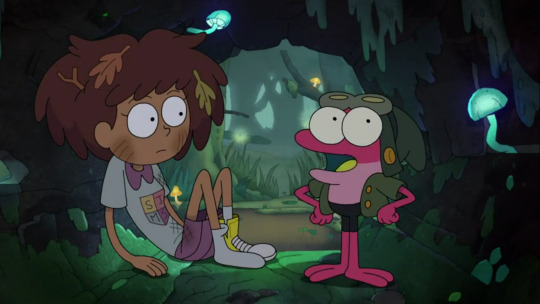

Amphibia's 6th anniversary is fast approaching, so to celebrate I felt it would be fitting to review the show's first ever episode, which made me fall in love with this utterly amazing show that even today remains one of my favorite animated series of all time.
Set in the titular world of Amphibia, the show focused on Anne Boonchuy, a teenage girl who along with her friends Sasha Waybright and Marcy Wu ended up being transported there and her attempts to get home while bonding with the local frog population, in particular the Plantar family who essentially adopt Anne as one of their own.
Anne or Beast? is a perfect introduction to the show, beginning with One-Eyed Wally, one of the locals in the town of Wartwood encountering a strange beast in the forest one night. When news of this spreads, Sprig Plantar, wishing to prove himself responsible takes it upon himself to find and capture the beast. The beast is actually Anne and soon she and Sprig bond, but when an angry mob catch up to them, Sprig must defend his new human friend from harm.
Although Anne's face is already seen in the opening titles, the way the episode builds up to her first appearance by making her seem like a mysterious monster is handled well. Once Sprig encounters her, the interactions between them are superbly written as they soon befriend each other and Sprig does his best to help Anne. It's clear from these scenes their friendship has a lot of potential which the rest of the show would make the most of and these moments are really heart-warming.
Sprig defending Anne from the mob is another good scene that helps to prove his friendship with Anne is genuine and that he is capable of being responsible, which his grandfather Hop-Pop had doubted earlier on. The segment's ending with Anne being taken in by the Plantars helps end this first segment on a high note while also promising mystery for the future as Anne attempts to open the music box seen in the opening titles that transported the girls to Amphibia, hoping to get back home only to find it doesn't work.
The opening scene of the second segment, Best Fronds helps establish some background on why Anne ended up in Amphibia, with her stealing the music box from a thrift store before opening it, leading to her, Sasha and Marcy being transported to Amphibia.
She wakes up thinking what happened was just a dream, but she has woken up still in Amphibia, this scene does a good job of showing how Anne still can't quite believe she's in another world.
With Anne or Beast? having helped set up the show's premise, this enables Best Fronds to focus more on Anne and Sprig's developing friendship as they decide to go swimming in a nearby lake.
It is interesting to see how their previous friendship experiences provide contrasting expectations on how they feel their friendship should be. Sprig struggled to make friends before and that Anne is the first true friend he has, so he has little idea how it should work. Anne meanwhile from her previous experiences thinks that friendship should be about getting everything they want no matter what the cost. This attitude is clearly shown when Anne essentially forces Sprig into entering the lake, disregarding the warning sign not to swim that Sprig feels should be taken seriously.
As the pair eventually come under attack by a sea serpent and Sprig once again attempts to defend Anne from danger, this ends up challenging Anne's previous ideas on what friendship should be, with Sprig willing to protect Anne even if he himself ends up in danger.
Both segments also have their funnier moments, particularly from Sprig's younger sister Polly who claims to be more responsible than Sprig yet is easily tempted by candy and all but hopes Anne would try and eat her so she can fight back with a rolling pin.
Overall, this first episode of Amphibia makes a really strong first impression, particularly with the early scenes of Anne and Sprig's friendship, rewatching it, it is no wonder that Amphibia quickly became a favorite show of mine, if you still haven't seen it, I recommend it highly!
3 notes
·
View notes
Text
Z Cars - Pressure (20 September 1978)
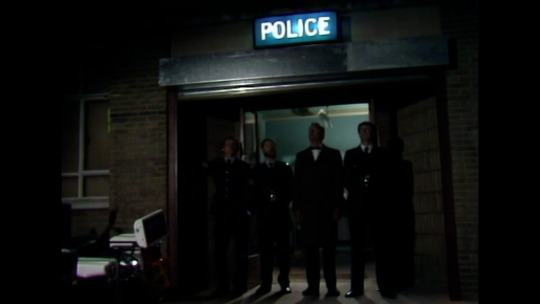
Talking Pictures TV's truncated reruns of surviving Z Cars episodes from the 1970s ended yesterday with the broadcast of Pressure, the final ever episode of the show broadcast in 1978 (not to be confused with an earlier episode of the show bearing the same title in 1974).
A slightly extended episode of the show running almost an hour compared to most episodes seen that ran between 45 and 50 minutes, the longer run-time is justified as this final episode packs a lot in to end the show on a high. In addition to the cast of characters who were regulars by this time, Brian Blessed, Colin Welland, Jeremy Kemp and Joseph Brady (all listed under a 'Special Appearances' caption in the end credits) who had all played regular characters in the show's early days reappear in small cameo roles playing different characters.
Meanwhile, Frank Windsor reprises his role of John Watt, now promoted to chief superintendent, having last been seen in Z Cars in 1965 and in the meantime having appeared in a bunch of spinoffs alongside his partner, Stratford Johns' Charlie Barlow (who does not appear in Pressure) including Softly Softly and Softly Softly: Task Force. John Philips, who had occasionally played Chief Constable Robins at times during the show's history also reprises his role.
Many plotlines run simultaneously during this episode, with none especially receiving precedence above all the others. As a detailed breakdown of all these plotlines would run too long, here are the basic outlines of each one:
Ferris (Tony Haygarth) returns home to Newtown from Amsterdam newly rich searching for his wife and children, flashing his cash everywhere, he eventually runs into trouble with both the police and muggers.
Inspector Lynch (James Ellis) looks after Danny Parton (Michael Gordon), a young boy who has been left alone after his mother and brother left home.
A dangerous gas leak has developed which may force an evacuation of the affected area, Inspector Lynch has to repeatedly reassure residents reporting the leak at the police station the matter is being dealt with.
Watt interviews Boley (Alun Armstrong), a detective superintendent accused of corruption, which eventually gets Robins involved as Boley is an old friend of his.
Major Philpot (Gavin Richards) assesses Newtown police station's potential for defensive improvements against violent attack.
Each of these plotlines provides their own moments of interest and there are some great performances too, most particularly from Tony Haygarth and Gavin Richards as Ferris and Major Philpot. Both characters are extremely memorable, particularly Ferris' talent for coming up with rhymes for whatever situation he finds himself in and Philpot's bizarre approach to improving police station security, where he even distrusts the potted plant on display in the police station's front office!
Indeed, there is a lot of great wit and humor in this episode while also providing some drama and tension, most notably with the gas leak plotline. Also, having appeared as a regular all throughout the show's life, it's fitting this final episode puts Inspector Lynch in the spotlight once more with James Ellis reliably playing the character as well as he always did.
The episode's final moments, and indeed those of the whole show bring events to a close in a magnificent manner. As Inspector Lynch bids farewell to Watt, who will soon be retiring from the force while Lynch must wait a few years more before his own retirement ("If I don't go mad first" as Lynch qualifies his statement), Major Philpot is ready to demonstrate the new steel shutters he has installed. The episode ends with the shutters descending, symbolically bringing the series to a close.
It is a simple ending, but utterly beautiful in it's simplicity, a superb ending to a fitting finale for one of British TV's finest police shows. While this rerun of Z Cars was ultimately truncated and skipped significant gaps between episodes despite the majority of episodes from this time period surviving, Talking Pictures TV announced that they will one day be showing the earlier black and white episodes (having begun these reruns with The Cinder Path from 1973), I hope I will get to see them too as generally I have greatly enjoyed the episodes that have been shown and wish to see more.
0 notes
Text
50/50 Heroes - Guitar Mo-Zart (Episode 32; 20 March 2023)
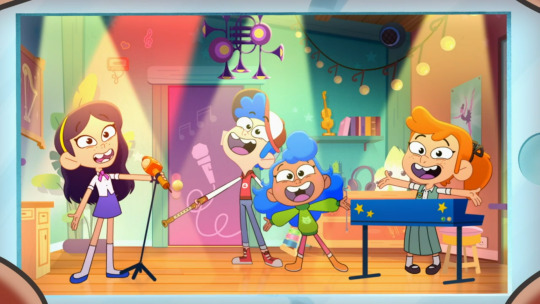
Sam's song for the PDRAs (Physically Disadvantaged Rescue Animals) is turned down and noticing that she is sad because of this, Stella decides to help remake the song. As she gathers her band together, Mo claims to be able to play guitar in order to impress her (claiming he is known as Guitar Mo-Zart, hence this episode's title).
As Mo actually has no real guitar skills, he ends up summoning a power to become an amazing musician, which in half-power form gives Mo and Sam an irresistible urge to play music using anything they come across. As Sam attempts to find another way to artistically express her support for the PDRAs and Mo attempts to obtain an actual guitar in order to help Stella's re-recording of Sam's earlier song, will Mo actually be able to use his new musical talents for good?
The music power may be an obvious choice, but it is another example of how 50/50 Heroes takes the idea of what would happen when a certain power is summoned and takes full advantage of it to create several entertaining moments as Mo uses everything he sees to make music while Sam inadvertently uses Hammy as a drum and also rhythmically slams the door shut several times in front of her grouchy neighbour Miss Rosie!
A library scene where Mo attempts to make his way quietly to Danny who has the guitar he needs while irresistibly making music along the way is another highlight of how the music power is used in a highly amusing manner with all the noise drawing the ire of the strict librarian, who apart from the first time ends up reprimanding the others Mo comes across for the noise they did not actually make.
More amusing moments include one earlier in the episode when Lenny pretends to have amazing guitar skills as Stella attempts to recruit her band but it turns out his playing is fake and Amber is not impressed while another later on sees Mo playing the guitar case instead of the actual guitar when he finally arrives to join Stella's band!
On a more emotional level, this episode does a good job of expressing Sam's disappointment and desperation as she tries to create something good for the PDRAs and the episode's conclusion brings events to a happy conclusion as Mo and Sam finally make the most of their musical talents, in turn helping Stella's attempts to help Sam while Mo has a sweet moment where he confesses the truth of his guitar playing skills to Stella.
Overall, Guitar Mo-Zart is another fine episode of 50/50 Heroes, proving once more that the show can be relied upon to take full advantage of the humorous and interesting potential of the powers Mo and Sam end up summoning.
0 notes
Text
Public Eye - The Man Who Didn't Eat Sweets (Season 5 Episode 9; 1 September 1971)

Sweet shop owner Julia Meadows (Marjie Lawrence) hires Frank Marker (Alfred Burke) to investigate her husband Eddie (Peter Sallis) when she finds a photo of another woman in one of his jackets that contains a love message from someone called Jenny. Eddie travels round the country as part of his job and only sees his wife for 2 days each week. A couple of other things seem suspicious about Eddie, including the fact he takes chocolate with him when he goes away each week but yet he doesn't eat it when Julia's around.
Marker, using a hired Bedford van follows Eddie as he travels round the country during the week, first to Northampton, then Cheltenham. His investigations reveal something even worse than Julia's suspicions that Eddie is having an affair: she is not Eddie's only wife, he is also married to Northampton hotel owner Adele (Jean Harvey) and clothes shop proprietor Constance (Dorothy Primrose).
The first of 4 contributions to Public Eye by Richard Harris (a writer who is nothing to do with the Irish actor well-known for appearing in movies such as This Sporting Life, Gladiator and the first 2 Harry Potter movies) is an extremely impressive debut, in fact in my opinion, The Man Who Didn't Eat Sweets is one of the very finest episodes of Public Eye's entire run.
Mainly this is due to the superbly written characters and dilemmas faced by Marker and Eddie Meadows. Marker's dilemma is whether to tell Julia the full truth of what's happening as he phones her on numerous occasions and apparently prepares to tell her what he's found out only to back down and not tell her about Eddie's other wives. As the marriage otherwise seems to be a happy one and Eddie truly does care about all his wives, Marker perhaps feels the truth may do a lot more harm than good here for a change.
Nevertheless, as he admits to Marker when confronted, Eddie realizes that he won't be able to keep up his current act of cycling between his 3 wives forever and that things are inevitably going to collapse one day, with the daughter (Ann Penfold) he's had with Adele about to get married herself and Constance, the oldest of his wives likely to require care at some point in the future.
Indeed, the confrontation between Marker and Eddie is the highlight of the episode, with Marker's disgust for Eddie's bigamy all too obvious while Eddie tries to explain how he got into it all. The excellent writing and dialogue in this scene is carried off really well by the excellent performances of Alfred Burke and Peter Sallis, who match each other well. Although what Eddie is doing is clearly illegal, the way he expresses how he got into it and his love for all his wives almost makes him sympathetic and he gets some great lines, particularly when expressing his fear of what might happen if a situation develops where all his wives discover what's really going on:
"Well, I used to have this dream. I dreamt I had an accident, a bad accident. I'm lying in hospital and the doctor says "Not to worry old chap, we've informed your next of kin". Visiting day, the doors open and there they are, all of them. Flowers and chocolates, advancing towards the bed, looking at each other, all wondering and waiting for me to supply the answer".
The way the script handles the identity of Jenny is also interesting, when we see her with Eddie in a car, we are initially led to believe that they are indeed having an affair like Julia suspects and that she's about to become wife No.4, particularly as Eddie tells her "You're going to look very beautiful at that church next week" before she corrects him with "Registry office", suggesting very much they are going to marry. The twist therefore regarding Jenny's actual identity is handled well.
Eddie's wives are also interesting characters, particularly Julia and Adele, as they have a good amount of screentime and get to interact with Marker as they tell him what they do and their relationship with Eddie. Julia's worry is also well portrayed thanks to a good performance from Marjie Lawrence, her second Public Eye role following her debut in the show in The Bromsgrove Venus. Adele is also an interesting character, being the everywoman owner of the Northampton hotel, taking it upon herself to do absolutely everything without any supporting staff.
If there's one complaint I have, it's that I wish we saw more of Constance, she only has one scene with Eddie near the end of the episode and never gets to meet Marker. As Eddie's oldest wife, her character deserves some more examination and her scene is tinged with a sense of tragedy as we learn she and Eddie never had children (unlike his marriages to Julia and Adele which have both produced children) and she is starting to fear what will happen as she grows older.
Finally, there is some good location filming taking Marker much further afield than his usual Windsor and Eton stomping ground as he follows Eddie to Northampton and Cheltenham in his rented Bedford van, these sequences are well directed by James Gatward (not to be confused with James Goddard, who has directed some Public Eye episodes already reviewed, Gatward would go on to direct The Bankrupt in Season 6 as well).
Overall, The Man Who Didn't Eat Sweets is in my opinion one of Public Eye's best ever episodes with a superbly written and engaging plot and characters, matched by great performances and direction. This truly is a special episode that displays all of Public Eye's finest qualities at their very best. If you're new to Public Eye, I have no hesitation recommending this as a good starting point for the show to make a great first impression.
0 notes
Text
50/50 Heroes - Sam Crawls the Web (Episode 31; 30 March 2023)

Sam is shocked and distressed when she receives only a 95% score and a B+ grade on her latest report, bringing her average grade down to an A- (compared with Mo's ecstatic celebrations when he scores 50% leading to him having a mini-dance party right there and then!).
With Mr. Brick about to send the class' latest report cards to their parents by email on his computer, Sam summons a power to enter computers so she can 'correct' her grade to raise her average. This leads to her entering Mr. Brick's computer while Mo ends up sucked into Lenny's new phone, but until they can meet and activate the full power, their presence is regarded as being like a virus and anti-virus software attempts to eliminate them...
The power to enter computers is another interesting power in a long line of interesting 50/50 Heroes powers, although this time the difference between the half and full powers is marginal, the only real difference being that when Mo and Sam harness the full power, they are not regarded as viruses inside the computer.
Mo and Sam's interaction with the different computer environments and the consequences of them interfering with the tech is the most interesting part of the episode. The inside of Mr. Brick's rather old fashioned computer looks grim and run-down compared to the shiny, glistening environment of Lenny's new phone.
Sam being a virus inside Mr. Brick's computer also inadvertently leads to her sending an altered video of Mr. Brick to everyone, leading to the whole class laughing, Mr. Brick threatening to reduce everyone's grade average as punishment and JC learning that Sam had sent it, leading to some suspense as Sam gets Mo and Lenny to distract Mr. Brick in order to buy time while she tries to fix the situation so JC can't expose her actions to Mr. Brick, avoiding trouble.
Mo's interactions with Lenny's various phone apps as he attempts to escape the anti-virus software chasing him are also fun and interesting to see and the running joke of Lenny accidentally dropping and damaging his phone is also funny.
The ending, in which Mo and Sam finally find their grades, with Mo pointing out Sam's hypocrisy as she attempts to change her grade while refusing to allow Mo to alter his also ends the episode on a good note, with this moment knocking some sense back into Sam, since of course her efforts to raise her grade are being done by rather dishonest means.
Overall, Sam Crawls the Web is another high quality and fun episode of 50/50 Heroes. Although the power could have been used a bit more imaginatively, the rest of the episode works so well that this minor flaw is easily forgiven.
0 notes
Text
Public Eye - Who Wants to be Told Bad News? (Season 5 Episode 8; 25 August 1971)
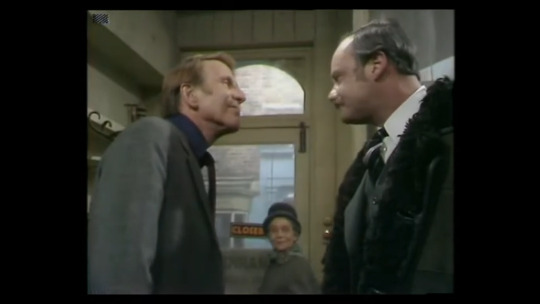
CONTENT WARNING: This episode deals with racism and prejudice, with some characters displaying attitudes that may be described as racist or prejudiced. In my judgement however, this episode ultimately does not endorse such attitudes, even if I consider the episode's handling of these matters awkward.
Alfred Bain (Glynn Edwards) is a local estate agent who knows Frank Marker (Alfred Burke). His aunt (Mollie Maureen) visits Marker's office with an unusual enquiry: she has lost her newspaper (the way the scene cuts right after she literally says "Well, you see, I lost my newspaper" to the first scene in Bain's estate agent shop is amusing as though she is bothering Marker with something remarkably trivial). As it turns out, it's no ordinary newspaper, it's a special newspaper from 1917 which lists her late fiancée as a World War I casualty. It was stolen during a recent burglary at her house and Marker agrees to help her get a photograph of another copy.
Meanwhile, Suresh Dhanar (Madhav Sharma), an Indian who has recently arrived in Windsor visits Bain's estate agent shop and asks to view an isolated cottage located 4 miles out of Windsor. Though he seems to be affluent enough, he lacks references, and so Bain hires Marker to check into Dhanar's background. Marker advises Bain to turn Dhanar down because of the lack of references but Bain thinks Marker is racially prejudiced and that Dhanar's Oxford education makes him trustworthy enough.
Marker's investigations into Dhanar reveal some odd quirks and contradictions. One example comes when he asks landlady Mrs Greene (Betty Alberge) who says that Dhanar is staying briefly with her while he and his sister look for a flat. But Dhanar's 'sister' is actually his wife (Surya Kumari) as he tells pretty much everyone else. Dhanar is also smart and realizes Marker is investigating him, leading him to meet with Marker and admit he has served a prison sentence for fraudulent conversion while working as an accountant in the hope that admitting the truth will make him seem less suspicious. However, it only convinces Marker that Dhanar is untrustworthy, but will Bain listen and why is he so interested in selling the cottage anyway?
At the risk of sounding like a preachy bore for the next paragraph, it is worth noting that as one of the very few Public Eye episodes in which a non-white character has a major role, this episode does require some scrutiny, particularly as the episode concerns whether or not Dhanar is a fully trustworthy character. Some of the white characters, particularly Bain and his secretary Agnes (Marianne Stone) make some rather questionable remarks about Dhanar and some scenes, for example the initial scene between Agnes and Dhanar can be cringe inducing and awkward to watch.
Dhanar's dialogue too sometimes seems to mock or play up to the prejudices of others with lines such as "Mr Bain, I assure you I have no intention of flooding Berkshire with immigrant Indians".
However, this episode's (the first of John Kershaw's five scripts for the show) greatest strength lies in it's characterisations. Glynn Edwards is excellent as Alfred Bain, the estate agent trying to sell his cottage to Dhanar. Edwards portrays both Bain's friendlier salesman side and his increasingly confrontational attitude well, with the later exchanges with Marker in his office being a highlight as Bain seems to blame Marker for his problems, reliably matched by Alfred Burke's usual excellent performance as Marker who is simply trying to get to the truth of the matter.
Madhav Sharma's performance as the well-spoken Dhanar is also good. He appears to be a rather innocent sort which allows him to be trusted by others rather easily despite his lack of references, which some excuse because of him being a recent arrival in Windsor. One fine example of how he quickly earns others' trust comes in the scene where he visits Mercer (Keith James) in his electronics shop and again despite the lack of references quickly gets himself seen as trustworthy and plays on Mercer's sympathies by telling him his wife really wants a radio to prevent boredom, ultimately being allowed to take the radio with him despite Dhanar only paying a cheque for a hire purchase deposit.
Although the fact he's above board isn't certain, Dhanar is still able to elicit sympathy, particularly when he tells Marker of his struggles to integrate and how his wife insists on still wearing traditional Indian clothes to be true to herself: "She wanted people to accept her for what she was, not pretend to be something else".
The aforementioned Mercer is another interesting character, well played by Keith James particularly in the scene where Marker visits the shop to question him about Dhanar, with Mercer seemingly resigned to the fact that some customers will essentially defraud him and that there's nothing that can be done about them.
But one of the most memorable characters in the whole episode despite her comparatively minor role is Bain's aunt, who is a sweet old woman whose attitude to Marker contrasts nicely with that of her nephew Alfred, particularly in the episodes's closing scene. Mollie Maureen's performance is one of the strongest in the entire episode and while she is generally sweet, the way she describes the fate of her fiancee to Marker is genuinely moving.
The ending to this episode proves to be a satisfying conclusion, perhaps proving true the old saying that there is no honour among thieves. One final thing that I feel is worth mentioning about this episode is Marker's laugh after he emerges from the isolated cottage during his investigation, it is perhaps the longest and heartiest laugh heard from Marker in the entire show and is a really amusing and memorable moment.
Overall, while Who Wants to be Told Bad News? may be slightly questionable with it's handling of racial matters and is therefore one Public Eye episode that has perhaps dated poorer than most, in fairness it's ultimately no better or worse than any number of other British TV shows from around the same time in this regard. But the interesting characters in this episode mean that this is still a decent episode overall, if not one of the show's best outings.
0 notes
Text
Phineas and Ferb - Rollercoaster/ Candace Loses Her Head (Season 1 Episode 1; 17 August 2007 and 5 February 2008*)


*- This refers to production order, Phineas and Ferb episode segments would often be broadcast out of order, particularly during the first season, hence the almost 6 month gap between the broadcast of both segments.
With a new season of Phineas and Ferb about to be broadcast on Disney Channel, the first new episodes since the original run of the show ended 10 years ago, now is a good chance to look back 18 years to when the show first began with it's first ever episode.
Rollercoaster, which, as the title suggests sees Phineas and Ferb building a rollercoaster immediately establishes the usual format of the show including it's main plot of the titular brothers building a large, ambitious creation, their older sister Candace's efforts to bust them and the subplot with Phineas and Ferb's pet platypus Perry assuming his secret identity as an agent fighting the evil schemes of Dr. Heinz Doofenshmirtz, which usually ends up merging with the main plot at the end causing whatever Phineas and Ferb have made to disappear before their mother can see it and thwarting Candace's attempts to bust them.
That said, while most of the main elements are already in place, some are not. For example, there is no episode-specific musical number, Doofenshmirtz's invention does not have the usual 'inator' suffix while Phineas' personality is slightly different, having a slightly less caring attitude and at one point outright lying to Candace about what he's doing. While not drastically different, these moments can be a little jarring when compared to his usual kinder and more honest personality that would dominate throughout the show. And his voice sounds so much younger here too compared to later episodes (Vincent Martella, who was only 14 when the show was first broadcast even now remains as the voice of Phineas in the revival).
Candace Loses Her Head, the second segment sees Candace travelling to Mount Rushmore with her family on her birthday where Phineas and Ferb add her face to the monument as a birthday gift to her. A few of the aforementioned elements that were missing in Rollercoaster finally appear here including a musical number, Doofenshmirtz referring to his latest invention with the 'inator' suffix and Phineas' personality being more in line with later episodes with him caring a lot about Candace to the point that he is prepared to do whatever he can to make her happy despite her frequent attempts to bust him and Ferb.
These segments aren't just interesting curios of what Phineas and Ferb was like in it's earliest days, they are both entertaining in their own right with the show's fun, simple and easy to enjoy plots in full evidence and several of the funny running gags being established here too. It's also a good introduction to several of the main characters with their unique and loveable personalities including Phineas being inventive, Ferb as the mostly silent one and Doofenshmirtz being an enjoyably over the top and hilarious villain.
Overall, this first episode makes for a very good first impression of Phineas and Ferb and rewatching this, it is no wonder that the show rapidly became a favorite of mine and became extremely popular among many others too. With the revival imminent, I can only hope that seeing the new episodes will be just as satisfying and fun as the original ones were, certainly expectations for the new episodes can be described as very high, but soon we will see if they can live up to these expectations.
4 notes
·
View notes
Text
Oswaldo - Coconut Wars (Season 4 Episode 8; 23 December 2020)
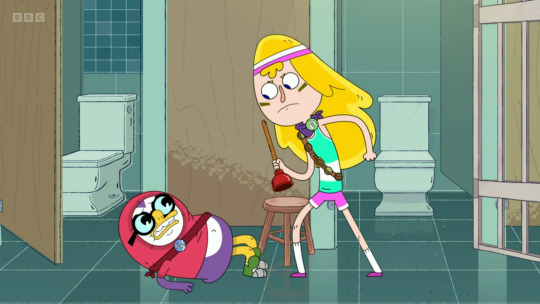
On occasion, Oswaldo would change things up by providing a unique twist on things or giving a supporting character a chance to shine. Episodes such as Fast Times at Oswaldo High and Jeorigins: Jermaine Begins are among two of the best examples of what the show was capable of when it tried something different and Coconut Wars is another successful example of Oswaldo doing something different: in this case giving sports lover Vivian a day in the spotlight.
At school, a coconut war is taking place with Mitchell's superior forces closing in on the headquarters of the smaller force commanded by Jermaine. Vivian arrives to train at the gym but she instead meets PJ who has been wounded by a coconut and tells her to pass a message onto Jermaine.
Jermaine then sends Vivian to find a hidden stock of coconuts for a counterattack, which is their last chance against Mitchell's forces. Vivian however ends up captured by Mitchell and Oswaldo, but eventually learns that Tobias, who has left the coconut war is the key to victory...
It's worth noting before continuing that the main trio of Oswaldo, Leia and Tobias are effectively side characters in the episode although some of the episode's most crucial scenes feature Vivian interacting with Oswaldo as he guards her once she's been captured and with Tobias as she learns what happened to him.
Nevertheless, Vivian makes the most of her chance to shine and proves that she is an interesting and loveable character as she becomes crucial to the eventual outcome of the coconut war. Seeing her confidently throw coconuts at the enemy forces and preparing a war outfit are among some of the best moments she gets in this episode and she also gets a funny scene as she reminds Ian (posing as a war journalist) that they have both known Tobias since the age of 5 since Ian is making it seem like she's never met Tobias before and that her life will be changed meeting him!
Vivian's eventual meeting with Tobias is another memorable moment in this episode and is really well-played as Tobias reassures her it's OK for her to win and gives her the real reason why he will not allow her to access the secret weapon he had devised. The atmosphere preceding this scene is also interesting with Vivian observing Tobias' kindergarten followers who seem to worship him as she approaches his lair.
The ending to the episode is also fun as the coconut war finally comes to an end and we learn the true fate of Tobias, bringing a hugely satisfying and unique episode of Oswaldo to an end, one of the best episodes of the show's 4th and final season.
0 notes
Text
Public Eye - And When You've Paid the Bill, You're None the Wiser (Season 5 Episode 7; 18 August 1971)
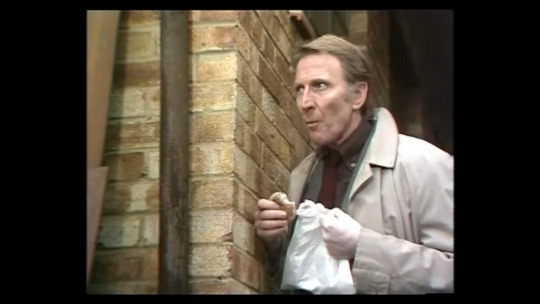
CONTENT WARNING: This episode deals with an investigation into a suicide and this review will mention the subject due to it's plot relevance.
The title of this episode is the longest of any surviving Public Eye episode, taking up 4 lines when displayed in the opening titles compared with the 1 or 2 lines required for every other episode in the season.
Beneath the extra-long and curious title however is a superbly written episode by Trevor Preston for his only Public Eye contribution that offers much interesting character drama and intrigue.
Psychologist Helen Kulman (Kathleen Michael), grieving for her son Peter who committed suicide 3 weeks ago visits Frank Marker (Alfred Burke) and asks him to investigate why exactly Peter committed suicide. While not questioning the coroner's verdict, she feels the rest of her family and the people Peter knew in life are trying to hide the truth to spare her feelings and wants to know exactly why 'the balance of his mind was disturbed' as the coroner's verdict puts it since to her he seemed happy enough in life and is struggling to comprehend why he did it.
Things quickly take an interesting turn when Marker finds out from the coroner (Clifford Parrish) that Peter died by jumping from a building being built by the construction company owned by Peter's uncle Geoffrey (George Pravda) and brother Martin (David Suchet). Geoffrey and Martin are both shady characters who very much seem to have something to hide, when Marker visits Martin, he does not want to talk about Peter at all and then calls Geoffrey home from a business visit to the Netherlands. Geoffrey then attempts to bribe Marker to drop the case before threatening him when Marker won't accept being bribed.
Another interesting factor is the presence of garage owner Bob Creeley (Dennis Chinnery) who breaks into Marker's office to find out what Marker knows. Creeley had been a security guard for the Kulmans' construction company but had left in mysterious circumstances shortly after a fire destroyed one of their new buildings in Kingston and opened the garage soon after. Marker suspects that Geoffrey and Martin had hired him to try and stop his investigation, using his former connection to the company as leverage.
More helpful are 2 of the women Peter knew. Caroline Stanford (Caroline Burt) was briefly engaged to Peter but is now married to a dentist. She hadn't been in contact with Peter since being married but blames Helen for Peter's suicide, claiming that she dominated him and tried to stifle his ambition to be an ornithologist, forcing him to study psychology to follow in her footsteps.
Jan Carling (Pippa Steel), an unusual woman with several unconventional beliefs had known Peter in the last four months of his life and tells Marker they had spent much time together because of how much like each other they were. She had also suspected from the beginning that Peter was suicidal and isn't as surprised he took his life. Their relationship was also unknown to Helen.
Trevor Preston's script is one of the best of the season and the execution is very well done thanks to good direction from Piers Haggard and the acting from everyone involved. There is a lot of interest here to keep the viewer gripped as the case eventually goes a lot deeper than simply finding out why Peter killed himself.
The casting is spot on with Kathleen Michael convincing as the grieving Helen Kulman who says she wants to find out the truth about what happened to Peter but the way she behaves sometimes leads Marker (and us) to suspect that maybe she doesn't quite want the whole truth in case it paints a picture of Peter at odds with what she thought of him. She is particularly reluctant to meet Jan for no good reason despite Marker's insistence that she has the answers being sought.
George Pravda and David Suchet (ironically playing the investigated instead of the investigator in a role 18 years before first playing Hercule Poirot) are also excellent as the shady Geoffrey and Martin who very much convince as having something to hide with their construction company apparently not above board. Pravda is particularly convincing as Geoffrey attempts to buy Marker off or otherwise cause trouble to prevent him finding out things they rather he didn't know.
Pippa Steel is also good as Jan Carling, portraying her unconventional side well and also being sympathetic as she comes to Marker with an unusual dilemma near the episode's end while Dennis Chinnery as Bob Creeley also does a fine job playing a different character with something to hide who does not welcome Marker's investigations.
And of course, Alfred Burke as Frank Marker impresses as usual with his characterisation here particularly interesting. He's reluctant to take on the case, stating quite clearly that trying to objectively find out why Peter killed himself is difficult since he deals more in facts rather than subjective matters and comes close to dropping the case a number of times as he is unsure he can investigate the matter satisfactorily, but eventually is persuaded to continue by Helen. The ending also shows his own dilemma, as he is conflicted on whether to tell Helen the complete truth or not.
Overall, And When You've Paid the Bill, You're None the Wiser is an excellent episode of Public Eye that has plenty to offer including an engaging plotline, interesting characters with equally interesting and diverse motivations and superb performances, as far as great Public Eye episodes go, this is near the top.
0 notes